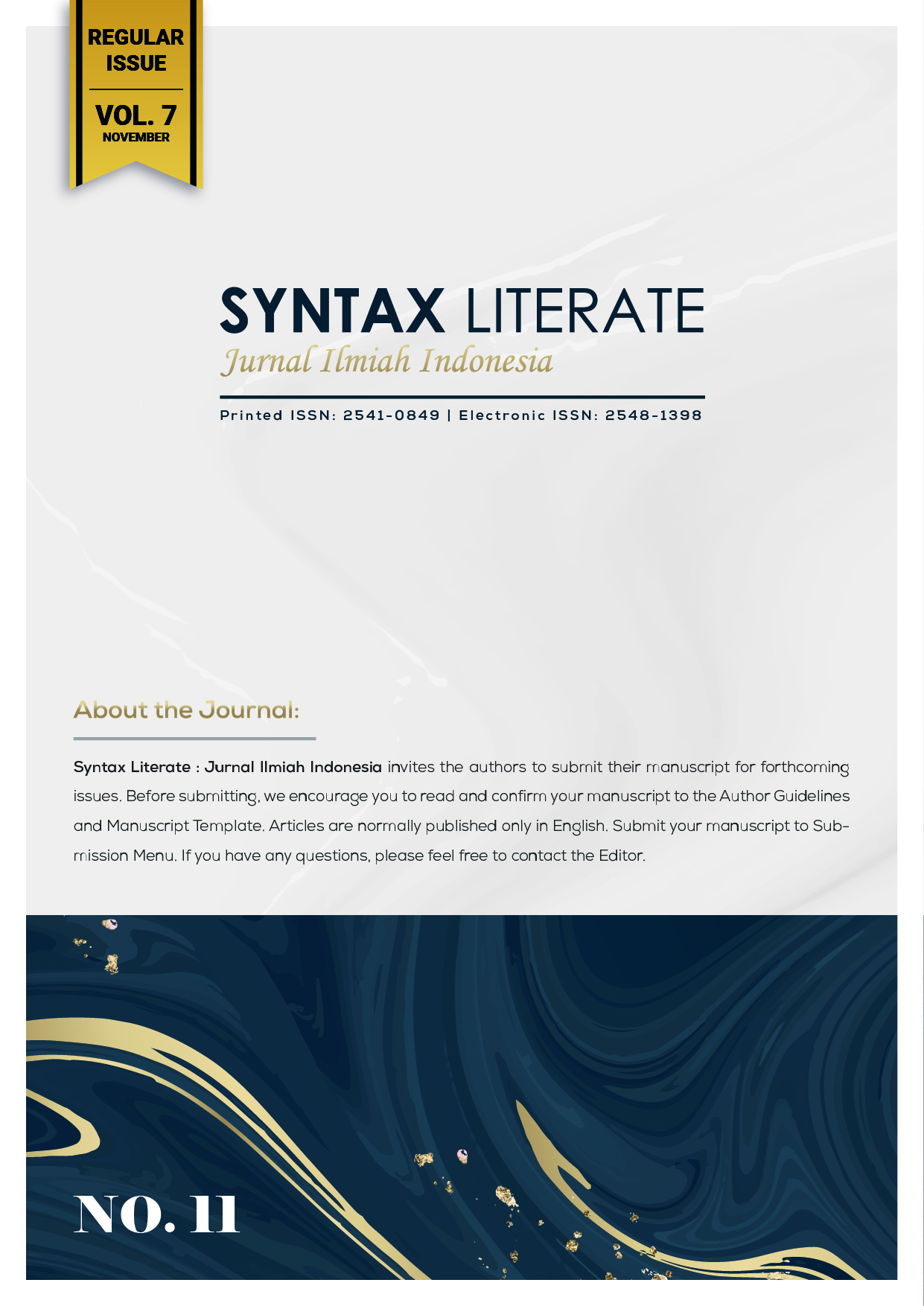“Faktor-Faktor yang Mempengaruhi Tingkat Kepercayaan Publik Terhadap Institusi Polri: Tagar #Percumalaporpolisi Dalam Menindaklanjuti Laporanâ€
Abstract
Penelitian ini bertujuan untuk mengetahui faktor-faktor penyebab keterlibatan publik dalam suatu online civic participation, yang dalam penelitian ini adalah #PercumaLaporPolisi, dan pengaruh aktivisme sosial ini terhadap penurunan tingkat kepercayaan masyarakat Indonesia terhadap institusi Polri. Penelitian ini mengambil jenis penelitian deskriptif dengan pendekatan kuantitatif. Penelitian ini menggunakan metode survei dengan menggunakan kuesioner sebagai alat pengumpulan data. Variabel yang akan digunakan adalah variabel bebas, variabel penghubung, dan variabel terikat. Penelitian ini akan memilih masyarakat umum sebagai populasi, dengan kriteria: umur 18-40 tahun, pengguna media sosial Twitter, dan pernah melihat atau mengikuti kasus #PercumaLaporPolisi, atau berita-berita lain di media sosial yang berkaitan dengan kelalaian polisi dalam menanggapi laporan warga. Jumlah sampel minimal dari penelitian ini adalah 385 orang. Penelitian ini akan menggunakan Structural Equation Model (SEM) dengan perangkat SmartPLS untuk menguji hipotesis. SEM merupakan metode statistik yang semakin banyak digunakan dalam studi ilmiah di bidang ilmu sosial. Hasil penelitian ini sebagai berikut: (1) Televisi dan media sosial memiliki pengaruh signifikan terhadap opinion leader, keduanya terbukti dari nilai p-value 0,000 (<0,050). (2) Televisi memiliki pengaruh signifikan terhadap tingkat kepercayaan publik pada institusi Polri, dengan nilai p-value 0,000 (<0,050). (3) Media sosial memiliki pengaruh signifikan terhadap civic participation, dengan nilai p-value 0,000 (<0,050). (4) Opinion leader memiliki pengaruh signifikan terhadap tingkat kepercayaan, dengan nilai p-value 0,011 (<0,050). (5) Kualitas pelayanan memiliki pengaruh signifikan terhadap tingkat kepercayaan, dengan nilai p-value 0,001 (<0,050). (6) Online reputation management memiliki pengaruh pengaruh signifikan terhadap civic participation, dengan nilai p-value 0,000 (<0,050). (7) Civic participation memiliki pengaruh signifikan terhadap tingkat kepercayaan, dengan nilai p-value 0,000 (<0,050).
Downloads
References
Aichner, T., Grünfelder, M., Maurer, O., & Jegeni, D. (2021). Twenty-Five Years of Social Media: A Review of Social Media Applications and Definitions from 1994 to 2019. Cyberpsychology, Behavior, and Social Networking, 24(4), 215–222. https://doi.org/10.1089/cyber.2020.0134
Bergström, A., & Jervelycke Belfrage, M. (2018). News in Social Media. Digital Journalism, 6(5), 583–598. https://doi.org/10.1080/21670811.2018.1423625
Chen, Q., Min, C., Zhang, W., Wang, G., Ma, X., & Evans, R. (2020). Unpacking the black box: How to promote citizen engagement through government social media during the COVID-19 crisis. Computers in Human Behavior, 110, 106380. https://doi.org/10.1016/j.chb.2020.106380
Chen, Y. (2021). Research on the Feminist Movement in the Internet Age from the Perspective of “Cultivation Theoryâ€. In 6th International Conference on Contemporary Education, Social Sciences and Humanities.(Philosophy of Being Human as the Core of Interdisciplinary Research)(ICCESSH 2021) (pp. 212-215). Atlantis Press.
Civelek, M. E. (2018). Essentials of Structural Equation Modeling. Adfo Books.
Dulock, H. L. (1993). Research Design: Descriptive Research. Journal of Pediatric Oncology Nursing, 10(4), 154–157. https://doi.org/10.1177/104345429301000406
Fawzi, N., Steindl, N., Obermaier, M., Prochazka, F., Arlt, D., Blöbaum, B., Dohle, M., Engelke, K. M., Hanitzsch, T., Jackob, N., Jakobs, I., Klawier, T., Post, S., Reinemann, C., Schweiger, W., & Ziegele, M. (2021). Concepts, causes and consequences of trust in news media – a literature review and framework. Annals of the International Communication Association, 45(2), 154–174. https://doi.org/10.1080/23808985.2021.1960181
Hajli, M. N. (2014). A study of the impact of social media on consumers. International Journal of Market Research, 56(3), 387–404. https://doi.org/10.2501/ijmr-2014-025
Happer, C., & Philo, G. (2013). The Role of the Media in the Construction of Public Belief and Social Change. Journal of Social and Political Psychology, 1(1), 321–336. https://doi.org/10.5964/jspp.v1i1.96
Hoyle, R. H. (1995). Structural Equation Modeling: Concepts, Issues, and Applications (1st ed.). SAGE Publications, Inc.
Karakiza, M. (2015). The Impact of Social Media in the Public Sector. Procedia - Social and Behavioral Sciences, 175, 384–392. https://doi.org/10.1016/j.sbspro.2015.01.1214
Khoi, B., & Cuong, D., T. (2019). The Relationship between Service Quality, Satisfaction, Trust and Customer Loyalty A Study of Convenience Stores in Vietnam.
Leung, D., Law, R., van Hoof, H., & Buhalis, D. (2013). Social Media in Tourism and Hospitality: A Literature Review. Journal of Travel & Tourism Marketing, 30(1–2), 3–22. https://doi.org/10.1080/10548408.2013.750919
Littlejohn, S. W., & Foss, K. A. (2009). Encyclopedia of Communication Theory (1st ed.). SAGE Publications, Inc.
Mansoor, M. (2021). Citizens’ trust in government as a function of good governance and government agency’s provision of quality information on social media during COVID-19. Government Information Quarterly, 38(4), 101597. https://doi.org/10.1016/j.giq.2021.101597
Nasidi, Y., Kamarudeen, A. M., & Bahaudin, A. Y. (2015). Relationship between Trasformational Leadership and Construction Waste Material Recycling among Construction Organizations. International Journal of Management Research and Reviews, 5(12), 1187.
Park, C. S. (2019). Revisiting the two-step flow model on Twitter: Interconnection of self-identified South Korean Twitter opinion leadership, news consumption, news links, and news curation. Electronic News, 13(2), 63-77.
Pering, I. M. A. A. (2020). Kajian Analisis Jalur Dengan Structural Equation Modeling (Sem) Smart-Pls 3.0. Jurnal Ilmiah Satyagraha, 3(2), 28-48.
Purwanto, A., Asbari, M., & Santoso, T. I. (2021). Education Management Research Data Analysis: Comparison of Results between Lisrel, Tetrad, GSCA, Amos, SmartPLS, WarpPLS, and SPSS For Small Samples. Nidhomul Haq, 6(2), 382–399. https://doi.org/10.31538/ndh.v6i2.1575
S. (2018). Quantitative Methods for the Social Sciences (1st ed. 2019 ed.). Springer.
Schaap, D. (2021). Police trust-building strategies. A socio-institutional, comparative approach. Policing & Society, 31(3), 304–320. https://doi.org/10.1080/10439463.2020.1726345
Suyanto, A., M., & Usu, I. (2019). The Role of Service Quality on Building Student Satisfaction
Turcotte, J., York, C., Irving, J., Scholl, R. M., & Pingree, R. J. (2015). News Recommendations from Social Media Opinion Leaders: Effects on Media Trust and Information Seeking. Journal of Computer-Mediated Communication, 20(5), 520–535. https://doi.org/10.1111/jcc4.12127
Warren, A. M., Sulaiman, A., & Jaafar, N. I. (2014). Social media effects on fostering online civic engagement and building citizen trust and trust in institutions. Government Information Quarterly, 31(2), 291–301. https://doi.org/10.1016/j.giq.2013.11.007
Zhi-Jin, Z., & Xinzhi, Z. (2017). A Mediation Path to Chinese Netizens' Civic Engagement: The Effects of News Usage, Civic Motivations, Online Expression and Discussion.
Copyright (c) 2022 Meivy Wilnio, Maura Alifa Nugrahutami Yunianto, Muhammad Mirza Adira

This work is licensed under a Creative Commons Attribution-ShareAlike 4.0 International License.











